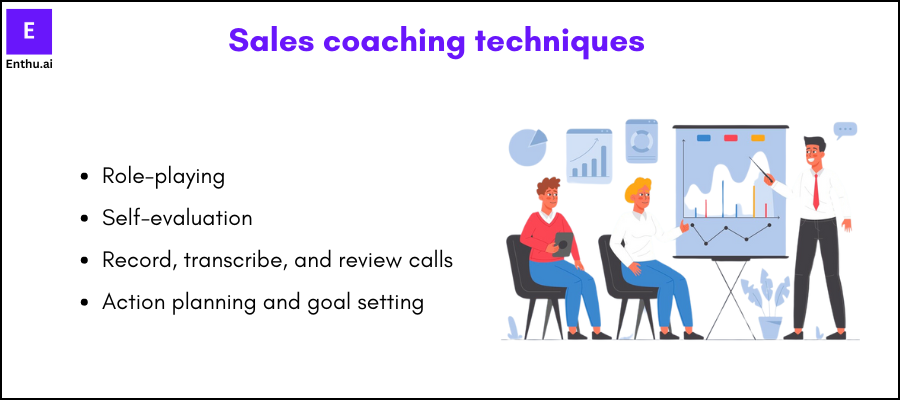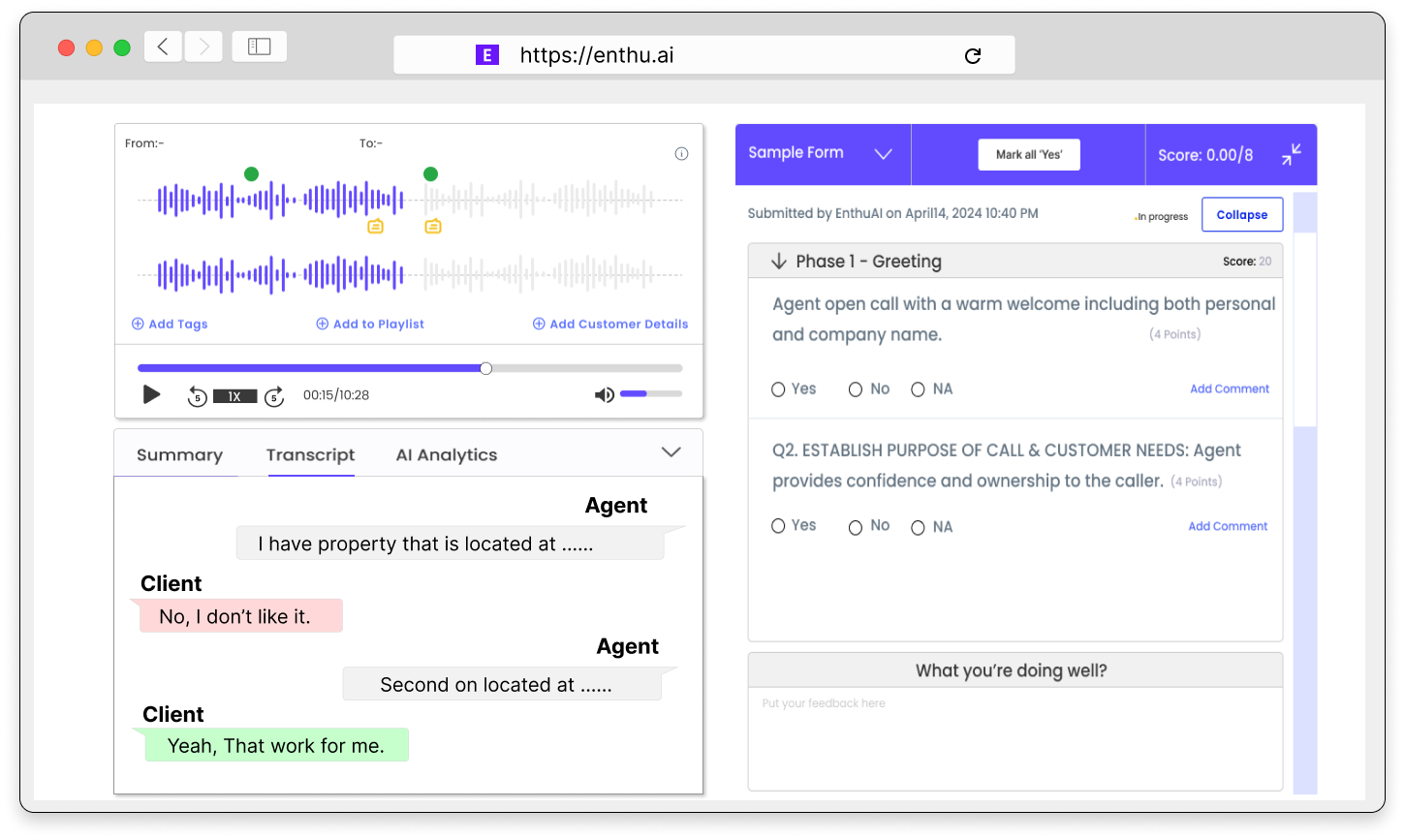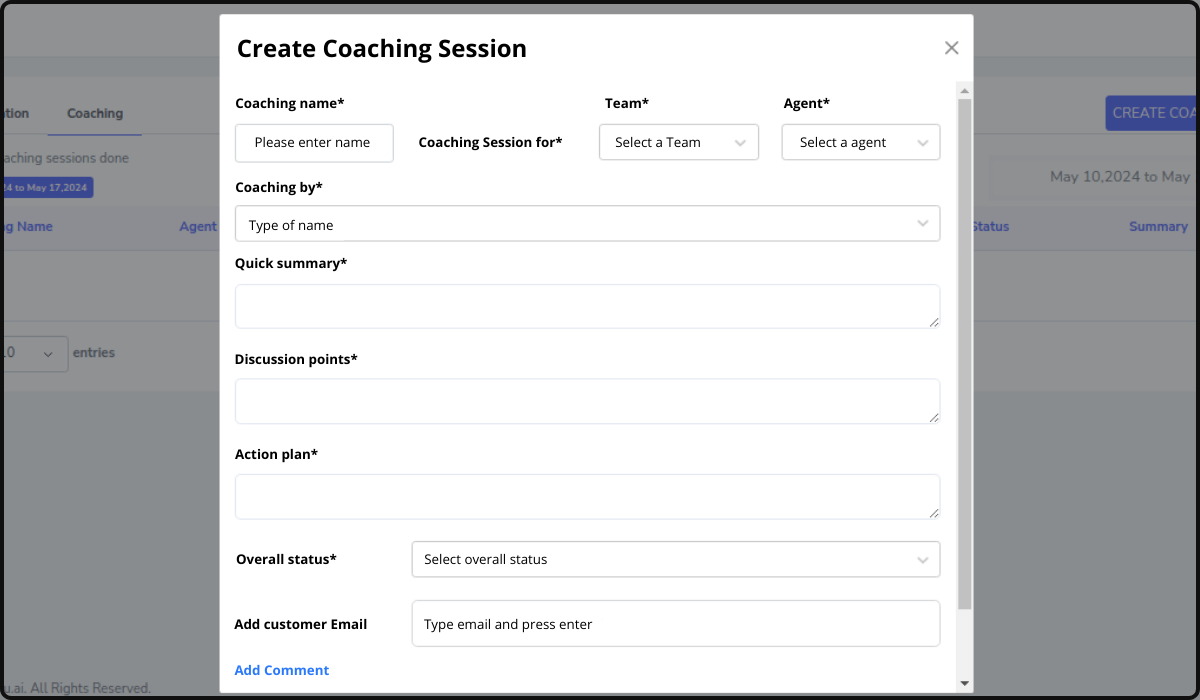Explore everything you need to know about sales coaching.
From the football World Cup to a local cricket match, you’ve seen those enthusiastic coaches. They always try to motivate their team or player, on and off the field.
In business-to-business sales, coaches are vital. They build sales reps’ skills, improve performance, and help meet goals.
A study found that sales reps with 30 minutes or less of sales training have a 43% win rate. Those with at least 2 hours of weekly coaching have a 56% win rate.
If your sales team fails to meet its goals, it’s your job as a sales manager to support your reps. You must help them close more deals and boost revenue.
But where do you start?
By the end of this article, you will have all you need. You will be ready to coach your sales team to exceed their targets.
A. What is sales coaching?
Sales coaching is for the betterment seekers – salespeople who want to learn, develop, and grow both personally and professionally.
Sales managers or leaders usually take responsibility for initiating a well-structured collaborative coaching program. The objective is to help sales reps achieve their best result possible.
To maximize your sales team with coaching, your coach must have all the necessary sales knowledge, skills, and techniques.
A great sales coach understands each rep’s strengths. They enhance their emotional intelligence. They ask insightful questions and give effective feedback. They help reps identify and overcome challenges.
C. Benefits of sales coaching
The benefits of sales coaching extend far beyond improved sales performance. Some key advantages include:
1. Setting goals

Sales coaching means setting SMART goals for each salesperson. They must be Specific, Measurable, Achievable, Relevant, and Time-bound. These goals should match their strengths and weaknesses.
These goals give clear direction and motivation. They break larger objectives into manageable tasks.
Regularly reviewing and adjusting goals keeps them aligned with changing circumstances and priorities.
2. Improving selling skills
Coaching, through one-on-one sessions and role-playing, refines key selling skills. These include active listening, objection handling, and building relationships.
Coaches provide constructive feedback and practical improvement tips.
It helps salespeople adapt to different customer personalities and situations.
3. Increasing win rates

Sales coaches analyze past sales to find success patterns. They then work with individuals to develop winning strategies.
They help sales pros understand customer pain points. They help them tailor their pitches and anticipate objections.
All this contributes to higher conversion rates and more closed deals.
4. Faster onboarding
Sales coaching accelerates onboarding by providing new hires personalized training and support.
Coaches guide them on product knowledge, sales methods, and company processes. This ensures a smooth transition into their roles.
This approach reduces the learning curve. It lets new team members generate revenue sooner.
5. Improving customer experience
Empathy-based coaching teaches sales teams to prioritize customers’ needs. They must deliver value-added solutions.
Coaches stress the need to build trust and rapport. It’s key to forming real connections with clients, beyond just transactions.
As a result, customers feel valued and understood, leading to enhanced satisfaction and loyalty.
6. Improving sales results

Sales coaching fosters a culture of improvement in the team. It values feedback and learning. Coaches address performance gaps and offer support. This empowers salespeople to reach their potential.
This focus on results boosts sales and revenue. It helps the organization succeed.
D. Sales coaching techniques
Effective sales coaching uses proven techniques. They aim to maximize each rep’s potential. Some techniques to consider include the following:

1. Role-playing
One of the most essential techniques for Role-playing in coaching is vital for skill development and confidence building.
It offers a safe space to practice diverse customer interactions and handle objections.
Through simulated scenarios, sales professionals refine their adaptability and critical thinking skills.
Role-playing also enhances listening abilities and encourages active engagement in learning.
Constructive feedback from coaches accelerates improvement and motivates continuous growth.
Additionally, it aligns coaching efforts with real-world sales challenges, ensuring practical relevance.
Role-playing fosters a culture of learning and growth in sales teams.
2. Self-evaluation
Encouraging self-evaluation before your one-on-one meetings is a great way to start.
It helps salespeople look at their performance honestly and see where they might need help.
You can give them a survey or questions to answer, like rating themselves from 1 to 10.
Some questions they can answer include:
- What went really well for you in the last few months or year?
- What were the hardest parts of your job during that time?
- What did you do to reach or beat your sales goals?
- How well did you connect with potential customers?
- Did you do any training or learning? If yes, what did you learn?
- What are your personal goals for the next few months or years, and how do they fit with what the team and company want to achieve?
3. Record, transcribe, and review calls

Recording, transcribing, and reviewing sales calls are pivotal in enhancing sales coaching methodologies. This process gives managers insights into their team’s performance. They can find areas to improve and grow.
Today, there are a plethora of sales coaching software you can use to record, transcribe, and review your agent calls.
- Performance evaluation: Assess the effectiveness of sales pitches, objection handling, and script adherence.
- Skill development: Targeted coaching to enhance active listening, objection handling, and closing techniques.
- Training material creation: Utilize successful call excerpts as training examples while highlighting areas for improvement.
- Feedback loop: Establish a continuous feedback loop between coaches and sales reps, encouraging improvement and growth.
4. Action planning and goal setting
Coaching involves key elements that guide to success and ongoing improvement. Firstly, clear goals provide direction and motivation. They help sales reps prioritize tasks and focus their efforts.
Also, action planning aligns sales activities with wider goals. It optimizes resource use and drives growth.
- Clarity and focus: Clear goals guide sales reps. They help them prioritize tasks and focus on their desired outcomes.
- Motivation and accountability: Goals inspire sales reps to succeed and hold them accountable.
- Strategic alignment: Action planning aligns sales activities with company goals. It optimizes resources and drives growth.
- Continuous improvement: Sales teams should regularly review and adjust their goals and action plans. This will help them adapt to changing market conditions and customer needs. It will also foster a culture of continuous improvement and agility.
B. What is the difference between a sales coach and a sales manager?

A sales coach and a sales manager play distinct yet complementary roles in a sales team.
A sales manager is more like a team captain.
They oversee the entire sales operation, set targets, and ensure the team hits its goals.
They handle things like performance reviews, resource allocation, and strategy development.
They’re focused on the bigger picture and making sure the team as a whole is successful.
On the other hand, a sales coach is more like a seasoned player who mentors and guides others to improve their skills.
They work closely with each team member. They provide feedback, training, and support to help them excel.
Their focus is on developing the skills and confidence of each salesperson to reach their full potential.
For example, imagine you’re on a football team.
The sales manager would be like the head coach. They would devise a game plan, analyze opponents’ strategies, and adjust to ensure the team wins the championship.
A sales coach would be like a veteran player. They would take the rookies under their wing. They would teach them the game’s finer points, refine their techniques, and boost their morale to perform at their best.
E. Get started with the best sales coaching platform
In today’s digital age, leveraging advanced technologies can supercharge your sales coaching efforts.
One such powerful sales coaching software that stands out is Enthu.AI.
With features such as conversation intelligence, call monitoring, speech analytics, sales coaching metrics and quality assurance, Enthu.AI empowers sales coaches to monitor calls, identify coaching opportunities, and easily track progress.
With its advanced AI-driven conversation analysis, Enthu.AI identifies key coaching opportunities within calls, providing actionable insights for targeted improvement.

Its feedback capabilities enable instant rating and sharing of feedback and empower coaches to intervene promptly and drive performance enhancements.
- Advanced AI-driven conversation analysis
- Real-time feedback capabilities
- Seamless integration with CRMs and VoIP systems
- Custom playlists for accelerated onboarding
- Exhaustive call filtering for targeted coaching
- Exceptional user experience with top-notch transcription quality and responsive support
Conclusion
This guide to sales coaching gives you valuable insights. It covers its importance, techniques, and benefits. It shows why you should invest in this critical part of sales management.
In today’s tough business world, success demands a skilled sales team. It also needs effective coaching to boost performance and drive results.
Coaching is vital for firms that want to boost sales and stay competitive.
Coaching helps sales teams exceed targets. It gives structured guidance, actionable feedback, and personalized support. It fosters a culture of continuous improvement.
The right coaching platform, like Enthu.AI, can help organizations. It can use advanced tech to streamline coaching, track performance, and boost revenue.
FAQs
1. What is Sales coaching?
Sales coaching is the process of guiding and training sales representatives to improve their skills, performance and results. It involves regular feedback, training and personalized support from sales teams.
2. How can technology enhance the effectiveness of sales coaching?
Technologies like conversation intelligence and sales coaching software provide valuable insights into rep performance, enabling coaches to identify trends, pinpoint areas for improvement, and track progress over time.
3. What are the roles and responsibilities of a sales coach?
The roles and responsibilities of a sales coach include providing constructive feedback, setting performance goals, offering training and development opportunities, identifying strengths and areas for improvement, and supporting the growth and success of sales team members.




 On this page
On this page












